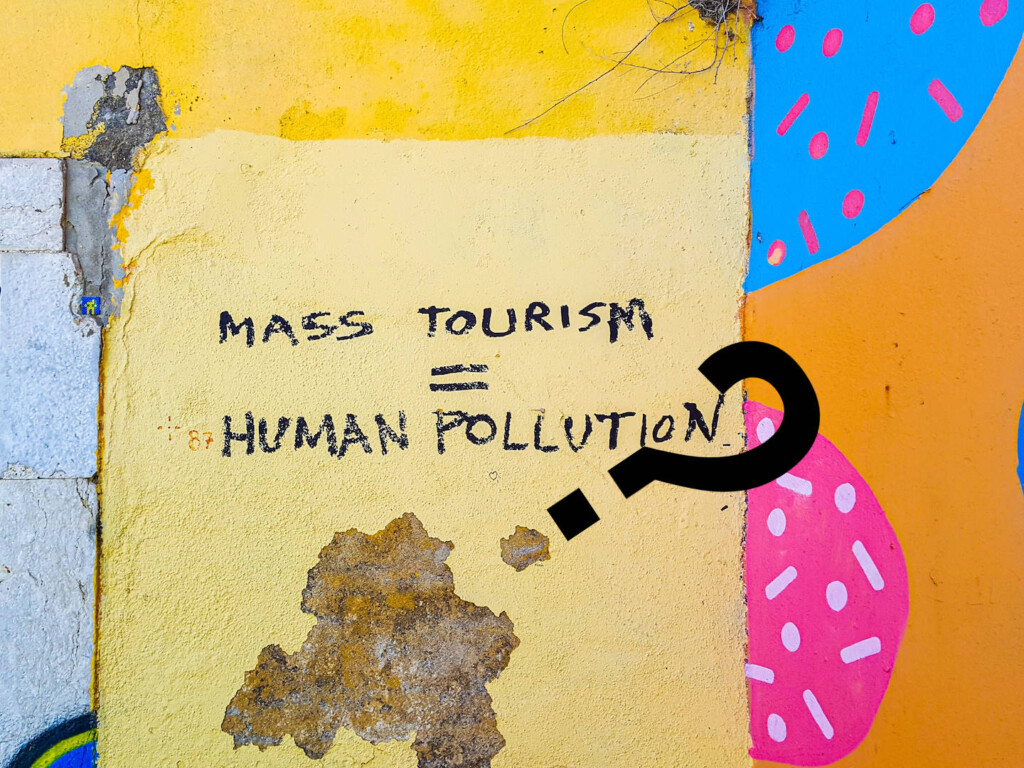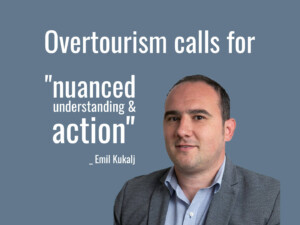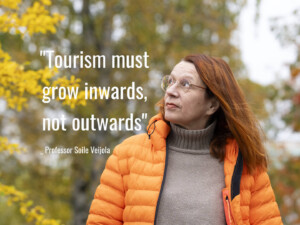What is ‘mass tourism’? And what’s the problem?

What is ‘mass tourism’? How do we think about it and talk about it? Do we consider all of its contexts, costs, and benefits?
Does mass tourism contribute to good lives? Or do ‘the masses’ only represent threat?
Does leisure travel for the many have its place in a ‘green’ future for us all? Or will it remain the privilege of a few?
Vilhelmiina Vainikka shared this “Good Tourism” Insight at the invitation of Tourism’s Horizon: Travel for the Millions, a “GT” Partner. (You too can write a “GT” Insight.)
Table of contents
- What is ‘mass tourism’?
- Quantitative vs qualitative definitions
- Contexts for mass tourism: The ‘good life’
- Is mass tourism a singularity or a plurality?
- Are the masses a threat?
- Let’s talk about mass tourism … deterministically or flexibly?
- Mass tourism vs the green transition
- Mass mobilities
- What do you think?
- About the author
- Featured image (top of post)
What is ‘mass tourism’?
Why would anyone ask such a question? Isn’t the answer obvious?
Presumably everyone using the term — in industry, academia, and in general — has some idea of what mass tourism might be. After all, it’s likely we have been tourists ourselves, many of us live in places that attract tourists, and many work in tourism.
Mass tourism is integral to our culture. But, as Raymond Williams argued in relation to the term ’culture’ itself, its ubiquity masks a range of contested understandings.
Don’t miss other “GT” posts tagged ‘Carrying capacity, mass tourism, & overtourism’
Researchers of tourism have probably had to define mass tourism in their publications. Tourism students have probably had to learn one or more definitions. We can say that most people — academics too, despite claimed expertise and authority — hold socially-constructed views of mass tourism.
There are many different definitions of and perspectives on mass tourism. My own doctoral research concentrated on the different ways professionals — academic researchers, package tour agents, and tour guides — think of mass tourism.
What is ‘mass tourism’? Quantitative vs qualitative definitions
When we define something, we are simultaneously part of creating that phenomenon. Language conveys meaning, but also constructs it. Definitions make something an understandable entity, drawing lines where it ends and something else begins.
One way to define mass tourism is as a quantitative notion. ‘Mass’ implies a large scale, involving many people (in relation to the global, regional, or local context in which mass tourism is perceived).
This quantitative notion is often tied to qualitative characteristics. Large numbers of tourists may be understood in a positive, neutral, or negative way. Today it is often understood as problematic, for example in the debates on ’overtourism’.
Mass tourism can also be approached in other, more qualitative ways:
- It can refer to a mode of production/consumption. So, for example, we might think of Fordist mass production, or economies of scale of mass production.
- It can refer to spatial specialisation. The resort as a space for mass tourism is an example of this.
- It can also carry a strong association with democratisation, such as access to tourism by sections of society; by social class, for example.
All of the categories mentioned above have changed — none are static — adding to the reality that mass tourism really needs thinking through.
Equally, mass tourism can also be understood as a ’super-umbrella term’ for tourism for ’the masses’, which combines the aforementioned perspectives. This suggests that numbers of tourists, the mode of production, the politics of consumption, physical manifestations such as the resort, and democratisation, are all part of a wider ideological and political infrastructure that we might call ’mass society’ or ’mass culture’.
The super-umbrella approach connects tourism to all of its historical, economic, and political contexts: the development of industrial society, political change, growth, (in)equality, technological advances, and infrastructures.
Notably in this framing, the niche modes of tourism (ecotourism, for example), which are often aesthetically and culturally counterposed to mass tourism, can be seen as being part of the mass phenomenon of tourism, just like the resort. This underlines the complexity of the phenomenon today.
Also read Sudipta K Sarkar’s “Good Tourism” Insight ‘Ecotourism for the masses, not the elite classes!’
Contexts for mass tourism: The ‘good life’
Context is important. Mass tourism is contextualised on spatial, temporal, and scalar terms; we experience it in space, time, and at a scale. Therefore, it is necessary to zoom in on different local, regional, and national contexts in which mass tourism is taking place. The histories of different communities with mass tourism, whether as destinations or as sources of tourists, are meaningful in understanding contemporary lifestyles and ideas of what constitutes a ’good life’.
Is mass tourism a singularity or a plurality?
The ‘mass’ in mass tourism is both a singular and a plural. The relationship between the two is key. In discussions of mass tourism, characterisations of the singular mass, or ’the masses’, can obscure the plurality of individuals, and individuality itself.
I have argued in my research that the usefulness of mass tourism as a concept is embedded in addressing this very relation; reflecting on what the ‘mass’ symbolises and what consequences it has for how we see our fellow humans.
Erik Cohen has urged more research on mass tourist experiences and underlined the possibility for both collective and individual experiences. We should allow space for both the singularity and the plurality in the discussions we have of mass tourism.
Are the masses a threat?
Seeing large numbers of people as a threat is not new, nor is it only a feature of debates about tourism. Christian Borch noted that crowds have often been perceived more as a threat than a solution in society.
Classical crowd theories hold that individual agency and individuality are lost in the mass mind, and that crowds threaten the social order. These theories emerged in part as an elite fear of unrest among the urban working masses. One could argue that these fears are sustained through contemporary prejudices.
Also read Jim Butcher’s “GT” Insight ‘Was this the European summer of terrible tourists? Give us a break, media!’
These ideas, and their modern manifestation, are often reductive. Rather than threatening, the crowd can be the very thing that is attractive about tourism experiences. For example, Jillian Rickly reminds us that part of the appeal in tourism are the events in which crowds gather and create an authentic experience.
Certainly, tourism is a form of competitive consumption. Often we wish there were no other tourists, and certainly no crowds, at the places we wish to admire and enjoy. But equally, in other contexts, crowds can be exciting, fun, human; the very essence of what anthropologists refer to as communitas.
Let’s talk about mass tourism … deterministically or flexibly?
Whether we are researchers, authorities, or tourism industry professionals, it matters how we discuss mass tourism. If we use a deterministic discourse, we liken mass tourism to a mould. Into that mould we pour the experiences of millions, but turn out a single, uniform entity: stereotypical mass tourism.
However, if we use a flexible discourse on mass tourism, we recognise that the phenomenon, including its production and consumption, changes over time and as technologies and knowledge are developed. This acknowledgement requires us to take a more dynamic conceptualisation and wider perspective on mass tourism. As a result, we get a more realistic portrayal of the phenomenon, which can lead to more fruitful discussions on its status and future.
Mass tourism vs the green transition
When we follow the discussion on the green transition for a sustainable future, we are challenged by the issue of ’quality over quantity’; a better type of tourism. It sounds reasonable because, of course, we wish tourism standards to be high in relation to the environment and local communities.
But as destinations seek to optimise benefits from tourism, ’quality over quantity’ can mean in practice ’the upper classes versus the masses’; ’quality’ tourism for the rich and better educated; ’quantity’ for the less enlightened ’mass tourist’ stereotype.
Also read Peter Smith’s “GT” Insight ‘For the sake of the world’s poor, might the risk of overtourism be worth it?’
Perhaps we should invest more in finding ways to accommodate as many as possible, while considering that tourism could be something different from what we have practiced so far. This may also make it easier to win support from ‘the masses’ — individuals seeking their own versions of the ‘good life’ — for reducing carbon emissions and addressing environmental concerns.
Ultimately, the masses vote, produce, and consume. Progressive, sustainable change needs to come through them. Caricatures of mass tourism are unlikely to win friends and influence people.
Mass mobilities
Finally, researchers have begun to investigate how climate change influences the mobilities of people, naming it ‘climate mobilities’. It is likely that we will face a blurring of the previous categories of mobility.
Climate change, and the impacts it has on different places, will likely increase migration and affect tourism. Categories of travel — voluntary/involuntary, leisure/residential, migration/refugee, short-term/long-term, etc — will be further complicated.
Therefore, we need to discuss how societies and mobilities will be constructed and for whom. Through it all we should remember that ‘the masses’ are the ’we’ and the ’us’; the ‘you’ and ‘I’; the prospective beneficiaries of true sustainable development.
What do you think?
What is ‘mass tourism’ to you? Share your own thoughts in a comment below. Or write a deeper “GT” Insight. The “Good Tourism” Blog welcomes diversity of opinion and perspective about travel & tourism, because travel & tourism is everyone’s business.
“GT” is where free thought travels.
About the author

Vilhelmiina Vainikka is a post-doctoral research fellow at Tampere University, Finland. She is working on the HUMANE-CLIMATE project (2022 – 2026), “the civic potential of climate mobility”, which is funded by the Academy of Finland.
Dr Vainikka contributed this “Good Tourism” Insight at the invitation of Tourism’s Horizon: Travel for the Millions, a “GT” Partner.
Featured image (top of post)
What is ‘mass tourism’? Is it, as this graffiti asserts, “human pollution”? Image by Mark de Jong (CC0) via Unsplash. “GT” cropped the image and added the dangling ‘?’.




![What is 'mass tourism'? And what's the problem? 6 Professor Dimitrios Buhalis on the ‘democratisation of tourism’ vs ‘overtourism’ ... “[T]here is no such thing as overtourism!”](https://www.goodtourismblog.com/wp-content/uploads/2024/02/Professor-Dimitrios-Buhalis-300x225.jpg)
